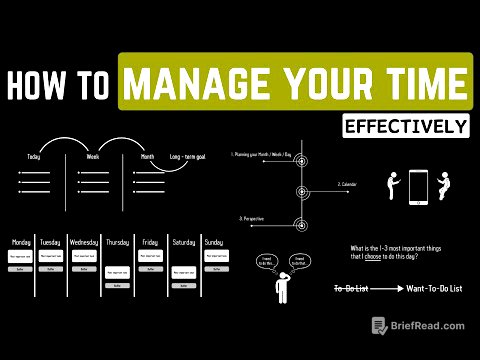TLDR;
This video explores Carl Jung's theory of personality types, emphasizing the importance of understanding your dominant function (thinking, feeling, sensing, or intuiting) and how it interacts with introversion and extraversion. It discusses the eight distinct personality types that arise from these combinations and highlights the significance of integrating weaker functions and the shadow self for personal growth and achieving wholeness through individuation. The video also addresses common misconceptions about Jung's theories, particularly regarding rigid categorization and the misinterpretation of introversion and extraversion.
- Jung's personality theory emphasizes understanding your dominant function (thinking, feeling, sensing, or intuiting) and its interaction with introversion/extraversion.
- The video explores eight distinct personality types and the importance of integrating weaker functions for personal growth.
- Individuation, the process of integrating all aspects of oneself, is presented as key to achieving wholeness and self-realization.
Introduction to Carl Jung's Personality Types [0:03]
The video introduces Carl Jung's theory that individuals fall into one of four personality types: thinkers, feelers, sensors, and intuitives. It challenges the notion that people are aware of their true type, suggesting societal conditioning may lead individuals to adopt a type that isn't natural to them. Understanding one's dominant function brings clarity to decisions, relationships, and personal growth.
Introversion and Extraversion: Directing Mental Energy [3:11]
Jung identified introversion and extraversion as primary attitudes that shape how we direct mental energy. Introversion focuses on the inner world, while extraversion is oriented toward the external world. The video clarifies that introversion isn't shyness, and extraversion isn't simply being outgoing; they represent different ways of recharging and experiencing reality. These attitudes serve as a gateway to understanding the four personality functions.
The Four Personality Functions: Thinking, Feeling, Sensation, and Intuition [4:11]
The video describes the four personality functions: thinking (logic and analysis), feeling (values and emotions), sensation (tangible reality), and intuition (abstract meaning). Each person has a dominant function that influences their worldview. Recognizing this dominant function can alleviate exhaustion and unnatural feelings that arise from living outside one's true function.
Eight Personality Types: Combining Functions and Attitudes [6:22]
Each of the four functions can manifest in either an extroverted or introverted way, creating eight distinct personality types. Extroverted thinkers seek structure and efficiency, while introverted thinkers analyze logic internally. Extroverted feelers prioritize harmony and emotional balance, while introverted feelers are guided by an internal moral compass. Extroverted sensation types are realists grounded in the present, and introverted sensation types rely on past experiences. Extroverted intuition types are visionaries focused on possibilities, while introverted intuition types experience sudden, profound insights.
Dominant, Auxiliary, Tertiary, and Inferior Functions [12:25]
The video explains that personality isn't just one function but a hierarchy. The dominant function is the most relied upon, while the auxiliary function provides balance. The tertiary function exists in the background, and the inferior function, hidden in the unconscious, holds the most potential for growth. Integrating the inferior function is crucial for individuation and becoming whole.
Integrating Weaker Functions for Personal Growth [16:00]
Developing functions outside one's comfort zone is essential for personal growth. Practicing logical reasoning for feelers, emotional openness for thinkers, abstract thinking for sensation types, and grounding in the present for intuitives can lead to a more balanced and complete self. The goal is to expand who you are, not change who you are.
The Shadow Self: Unconscious Aspects of Personality [17:45]
The unconscious mind shapes us in ways we don't realize, including the shadow self, which comprises suppressed or denied aspects of ourselves. The shadow can manifest in unexpected ways, and ignoring it strengthens its influence. Understanding and integrating the shadow is key to self-awareness and wholeness.
Applying Jung's Types to Relationships, Careers, and Problem Solving [19:52]
Understanding Jung's personality types can transform relationships, career choices, and problem-solving approaches. Recognizing differences in how people process reality can unlock better communication and smarter decision-making. Knowing your dominant function can help you thrive in the right career and appreciate the strengths others bring to teamwork.
Misconceptions and Distortions of Jung's Theories [22:26]
The video addresses common misconceptions about Jung's theories, such as the idea that personality types are rigid categories. Jung saw them as fluid tendencies, not labels. Everyone has access to all four functions, and dismissing any of them creates imbalance. The MBTI, inspired by Jung's work, is criticized for oversimplifying his framework. Introversion and extraversion are also often misunderstood as simply shyness versus outgoingness.
Individuation: Becoming Who You Truly Are [24:52]
Individuation is the process of integrating all aspects of oneself to become whole, requiring confronting ignored parts of yourself. It's about self-realization, not self-improvement. Those who complete individuation achieve inner clarity and align their thoughts, emotions, and actions. The privilege of a lifetime is to become who you truly are.
Conclusion: Embracing the Journey of Self-Discovery [28:03]
The video concludes by emphasizing that personality is a complex interplay of strengths, weaknesses, and hidden aspects. Growth involves integrating every part of yourself, both known and unknown, conscious and unconscious. Individuation is about accepting the person you've always been beneath the surface.









